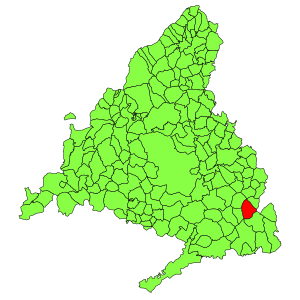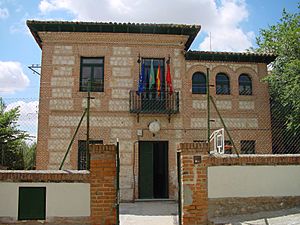Carabaña facts for kids
Quick facts for kids
Carabaña
|
|||
|---|---|---|---|
|
|||

Location of Carabaña in Madrid
|
|||
| Country | Spain | ||
| Autonomous community | Madrid | ||
| Area | |||
| • Total | 49 km2 (19 sq mi) | ||
| Elevation | 625 m (2,051 ft) | ||
| Population
(2018)
|
|||
| • Total | 1,905 | ||
| • Density | 38.9/km2 (100.7/sq mi) | ||
| Time zone | UTC+1 (CET) | ||
| • Summer (DST) | UTC+2 (CEST) | ||
| Website | http://www.ayuntamientocarabaña.es/ | ||
Carabaña is a small town in the Community of Madrid region of central Spain. It's about 50 kilometers (31 miles) from the big city of Madrid. Carabaña sits right by the Tajuña River, about 625 meters (2,050 feet) above sea level. In 2006, about 1,681 people lived there.
Contents
A Glimpse into Carabaña's Past
Carabaña has a very long history. It is one of the oldest towns in the Madrid region. People have lived here for over 2,000 years!
Ancient Origins: Celtiberians, Romans, and Visigoths
The town's story began even before the Romans arrived. The Celtiberians, an ancient group of people, called this place Caraca. Later, Carabaña was an important stop on a Roman road. This road connected the cities of Mérida and Tarragona. It was also a settlement for the Visigoths, another ancient group.
Carabaña's Famous Water
Carabaña is well-known for its special water. This water, called Agua de Carabaña, is believed to have healthy properties.
The Natural Spring's History
The natural spring is about 4 kilometers (2.5 miles) from the town. People have known about and used this spring since the time of the Ancient Romans.
Scientific Discovery of Health Benefits
In the late 1800s, a man named Ruperto García Chávarri had the water tested. Scientists confirmed that the water had special properties. It was found to be helpful for digestion, intestines, liver, and skin. This is because it has a lot of natural mineral salts. In 1928, the water was officially recognized as being important for public health.
Exploring Carabaña's Monuments
Carabaña has several interesting old buildings and sites to visit. These monuments show the town's rich history.
- Parish Church of the Assumption: This church was built in the 16th century. It was rebuilt after the Spanish Civil War.
- Fountain of Carlos III: You can find this beautiful fountain in the Main Square (Plaza Mayor).
- Palace of the Viceroy of the Indies: This palace also dates back to the 16th century.
- Hermitage of Santa Lucía: A hermitage is a small chapel or shrine.
- Bridge over River Tajuña: This old bridge was built in the 17th century.
- Visigothic Necropolis: This is an ancient burial ground from the Visigothic period.
- Prehistoric Caves: These caves show that people lived here even in prehistoric times.
The Tajuña Cycle Path
The Vía Verde del Tajuña is a popular cycle path. It goes right through Carabaña.
Following the Old Railway Line
This path follows the route of an old railway line. It runs close to the banks of the Tajuña River. The cycle path starts in Morata de Tajuña, which is 20 kilometers (12 miles) downstream. It ends in Ambite, about 14 kilometers (9 miles) upstream. It's a great way to explore the area by bike!
See also
 In Spanish: Carabaña para niños
In Spanish: Carabaña para niños
 | Isaac Myers |
 | D. Hamilton Jackson |
 | A. Philip Randolph |





